Introduction
Ho Chi Minh is an emblematic figure in Vietnamese history. Revolutionary, statesman and poet, he dedicated his life to the quest for independence for his homeland and the building of a united nation. His imprint remains deeply rooted in Vietnam, his name associated with patriotism and tenacity.
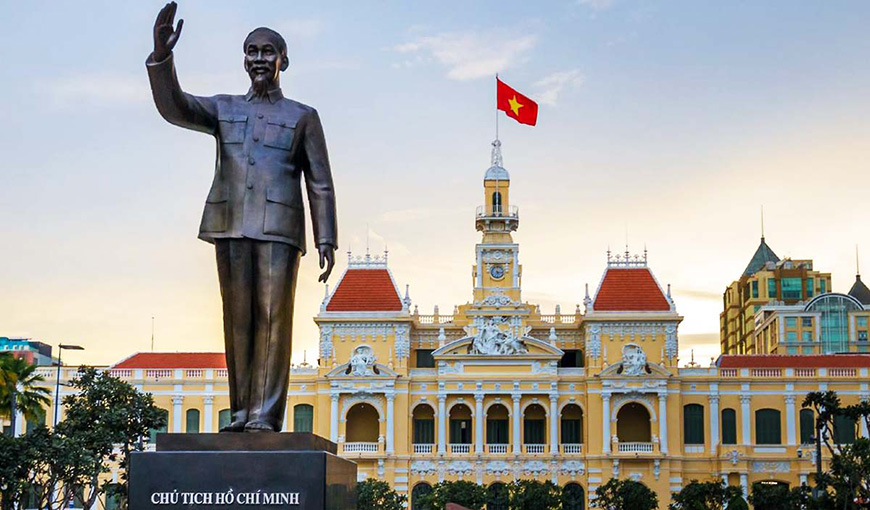 Statue of Ho Chi Minh, City Hall, Saigon - Source : Internet
Statue of Ho Chi Minh, City Hall, Saigon - Source : Internet
Youth (1890-1911): An awakening spirit
Real name Nguyen Sinh Cung, Nguyen Tat Thanh - better known as Ho Chi Minh - was born on May 19, 1890 in the village of Hoang Tru, Nghe An province, in central Vietnam. Born into a Confucian family steeped in patriotism, young Thanh developed a keen sense of morality from an early age, and an ardent desire to serve his homeland, then under the yoke of French colonization. His father, a scholar and patriot who had fought against the occupiers, instilled in him the values of justice and independence that would guide his future struggle.
A brilliant student admitted to the prestigious Quoc Hoc school in Hué, Thanh discovered the ideas of nationalism and revolution. However, his career was cut short when he was expelled for taking part in an anti-French movement.
In 1911, he embarked for France aboard an ocean liner, where he worked as an assistant cook. It was there that he became aware of social inequalities and the gap between the colonies and metropolitan France.
He then decided to devote himself body and soul to the struggle for the liberation of Vietnam.
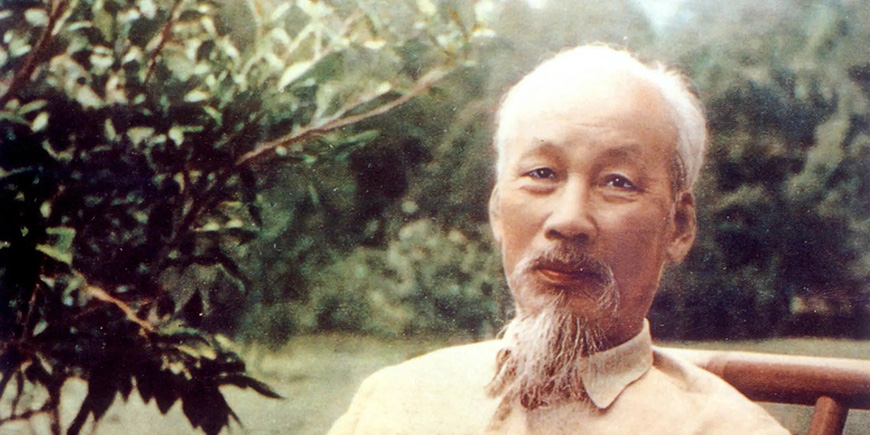
Portrait of Ho Chi Minh - Source : Getty Images
Exile (1911-1941): A revolutionary in the shadows
For nearly three decades, Ho Chi Minh criss-crossed Europe and Asia, making many decisive trips and encounters. In the course of his peregrinations on several continents, he observed different political systems and struggles for independence, confronting the realities of colonialism and the fight for the emancipation of peoples. This experience strengthened his determination to liberate his country from the colonial yoke.
In 1919, he returned to Paris, where he worked as a photo retoucher. This marked the beginning of his political involvement, when he joined the SFIO socialist party. Under the pseudonym Nguyen Ai Quoc (“Nguyen the Patriot”), he published writings calling for Vietnamese independence, and intervened at the Versailles Conference to demand the emancipation of his compatriots. In 1920, at the Tours congress, he embraced communism, attracted by its emphasis on the liberation of colonial peoples.
Still in the 1920s, Ho Chi Minh went to the Soviet Union, where he was trained in revolutionary tactics and became a member of the Communist International. He then led a life of itinerant militancy for the Comintern, alternating between propaganda missions in Southeast Asia and China, and stays in Moscow, where he was criticized for prioritizing Vietnamese patriotism over proletarian internationalism.
After stopovers in London, New York and Moscow, he moved to Canton in 1930 to found the Indochinese Communist Party. His years in exile enabled him to develop a global political and strategic vision, imbued with communist and anti-colonial ideals. Buoyed by this momentum, he began to build a network of revolutionaries who shared his quest for a free and independent Vietnam.
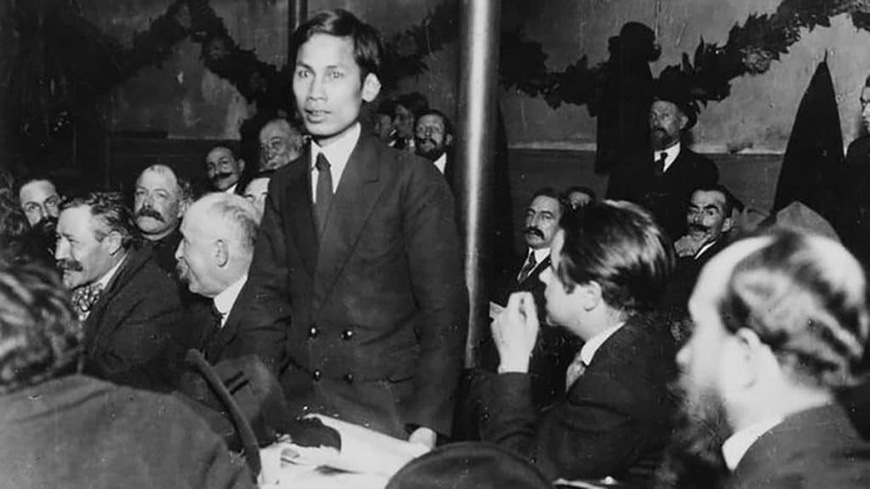
Ho Chi Minh in Paris, 1920 - Source : Manhai
The politician (1941-1969): Father of modern Vietnam
After escaping British jails and Stalinist purges, he returned to China, from where, taking advantage of Japan's entry into the war, he returned to Vietnam in 1941 after a thirty-year absence. Adopting the emblematic name of “Light Bearer” (meaning Ho Chi Minh), he began to forge his reputation as a charismatic leader and skilful strategist. Under this new identity, he became a fervent anti-colonialist and organized resistance against the French authorities, enduring multiple imprisonments without wavering in his determination. During his imprisonment, he wrote revolutionary poems and articles that inspired his compatriots.
In 1945, the surrender of Japan to the Allies gave Ho Chi Minh the opportunity to declare Vietnamese independence. On September 2, he proclaimed the creation of the Democratic Republic of Vietnam, but the French attempted to reassert their control, triggering the First Indochina War. Ho Chi Minh led the Viet Minh against the French through guerrilla warfare, mobilizing the population. In 1954, victory at Dien Bien Phu led to the Geneva Accords recognizing independence, but also dividing the country in two at the 17th parallel.
Ho Chi Minh became president of the Communist North and built a socialist state, while actively supporting the Viet Cong guerrilla war against the pro-American South from 1959 onwards, leading to American intervention in 1965. Reunification was as important as building socialism in the North. Although appearing to take a back seat to other figures such as Giap and Le Duc Tho, “Uncle Ho's” moral authority remained intact.
A charismatic leader and symbol of the national liberation movement, he died on September 2, 1969 at the age of 79, too soon to see the end of the war and the entry of Northern forces into Saigon, renamed Ho Chi Minh City in 1975.
Today, Ho Chi Minh is revered as a national hero in Vietnam, his effigy adorning coins, stamps and monuments across the country. An emblem of resistance against colonialism and imperialism, he dedicated his life to the quest for independence and freedom for his people, and his legacy continues to inspire generations of Vietnamese and people around the world.
His charisma, determination and leadership mobilized the Vietnamese people and inspired an entire nation. A true founding father of the Vietnamese nation, he left an indelible mark on his country's turbulent history, becoming a global symbol of the anti-colonial struggle. His aura radiates beyond borders, making him a tutelary figure whose career and commitment command admiration.
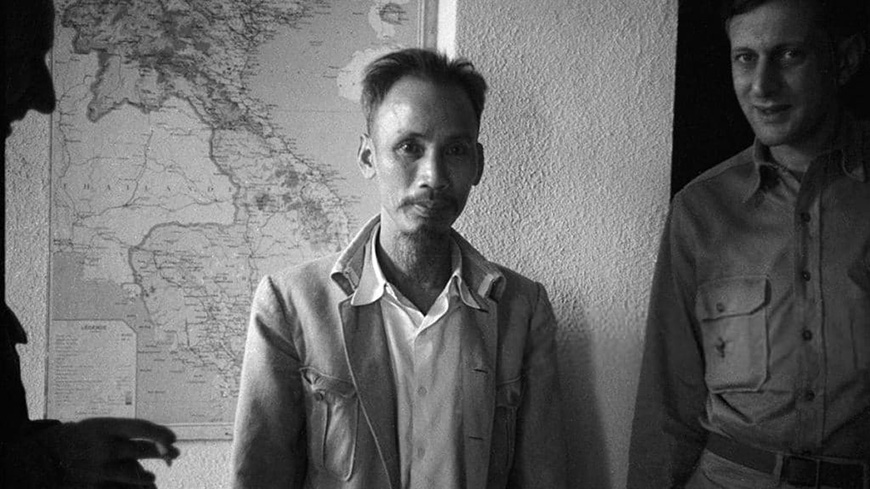
Ho Chi Minh in 1946 - Source : Manhai
Uncle Ho, a simple, charismatic man
Ho Chi Minh was renowned for his humility and simple lifestyle. Leading a modest existence, he shared his meals with his co-workers and helped out with manual labor. His charismatic personality and unwavering devotion to the cause of independence made him a revered figure among the Vietnamese people.
A revolutionary poet, he composed poems imbued with patriotism and stoicism during his imprisonments, to express his feelings and inspire his fellow fighters. His poetic work remains highly regarded today.
Perceived as a founding father by the Vietnamese, whom he affectionately called “my children”, Ho Chi Minh was revered by his people.
Despite his communist ideology, this pragmatic leader was prepared to compromise to achieve his goals, not hesitating to ally himself with non-communists in the anti-colonial struggle.
One of his most famous quotes sums up his determination: “Independence is not a gift, it must be conquered and defended.”
Ho Chi Minh, a complex legacy
A key figure in Vietnamese history, Ho Chi Minh remains a controversial figure.
His career has given rise to contrasting positions, with some hailing his patriotism and liberating determination, while others denounce the authoritarian excesses of his regime. But controversy aside, his imprint on modern Vietnamese history remains indelible, making him a major figure, worshipped by some, criticized by others.
Conclusion
A key figure in Vietnamese history, Ho Chi Minh profoundly influenced the country through his fight for independence and his role as its first president. His actions shaped modern Vietnam, while his legacy continues to inspire future generations. His name remains forever engraved in the collective memory of the Vietnamese people, as the tutelary figure who guided the nation towards sovereignty.
A symbol of the struggle for emancipation, Ho Chi Minh left an indelible imprint that transcends time. His career and achievements make him a pillar of Vietnamese national identity, revered for paving the way to freedom. His aura radiates beyond borders, consecrating his status as a major icon of the anti-colonial movement.
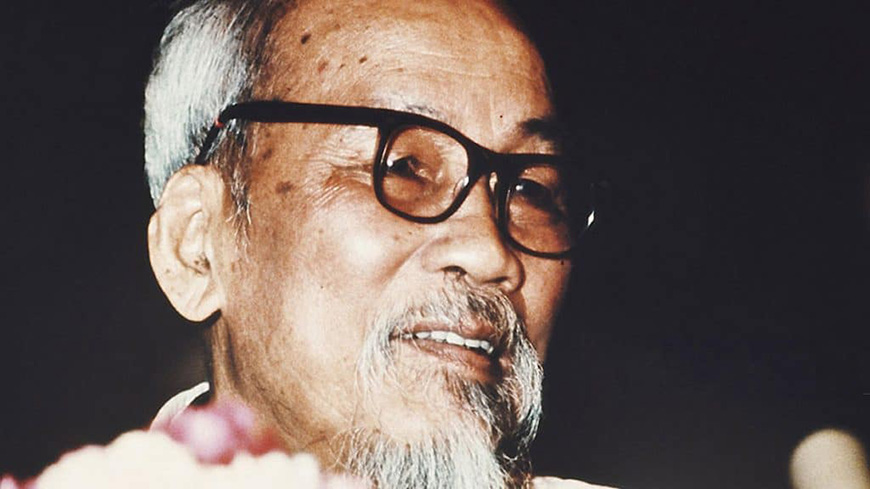
Uncle Ho, 1969 - Source : Manhai
Further afield
Visit Ho Chi Minh's mausoleum in Hanoi to pay your respects to the perfectly preserved remains of Vietnam's founding father.
Explore the Ho Chi Minh Museum in Hanoi to discover his life and work.
Read his poems and writings to understand his thoughts and vision of Vietnam.